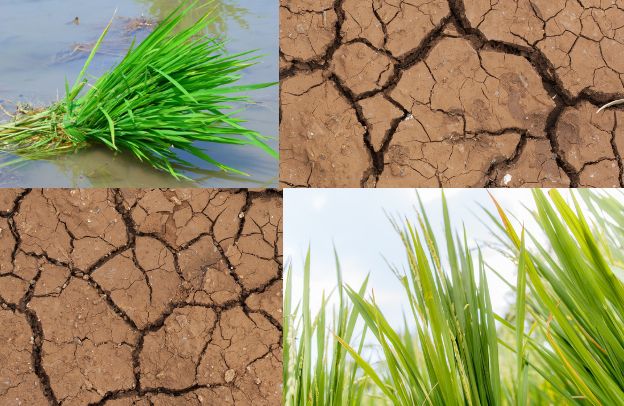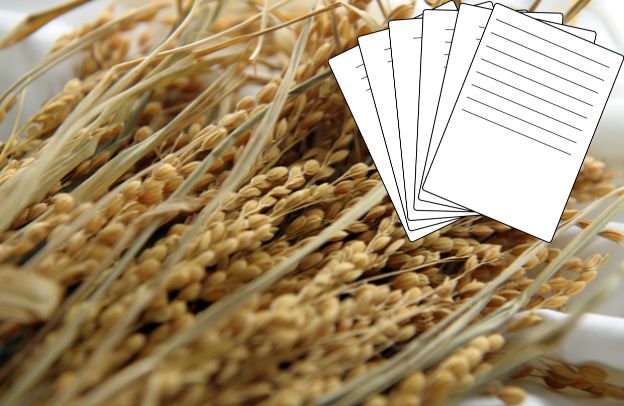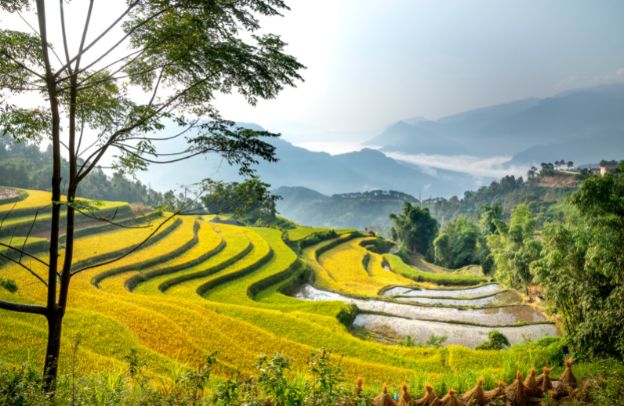The Impact of Climate Change on Rice Production in Africa: Building Resilient Agribusinesses Together

Imagine walking through the vast plains of West Africa. A farmer with weary eyes but hopeful, watches his fields of rice, fields that sustain countless families and entire communities. The stakes are high because rice is not just food; it is life, culture, and economic survival. Yet, the land has been changing, temperatures have soared, rains no longer come when they should, and floods threaten what is left.
Want to learn more about storytelling? Start by downloading the first chapter of The Storytelling Mastery.
You, as a member of the African diaspora, have a unique role to play. As climate change tightens its grip on agriculture, the opportunity to engage in Africa’s booming agribusiness sector has never been more urgent or more promising. This is not just about farming; it is about resilience, collaboration, and making an impact across the globe.
Climate Change and Its Effects on Rice Production
The reality of climate change hits African farmers hard, particularly those cultivating rice. Rice is a staple for over 3.5 billion people worldwide, and in Africa, its consumption has been growing rapidly due to urbanization and dietary changes. But its production is facing severe headwinds:
Rising Temperatures: In regions across Africa, average temperatures have been climbing. Rice grows best within a temperature range of 20-35°C. Anything higher can lead to crop failure. A 2019 report from the African Development Bank* noted that for every 1°C rise above the ideal temperature range, rice yields decrease by 10%. Imagine entire fields failing because of just a few extra degrees.
In the “State of Food and Agriculture 2024” report by the Food and Agriculture Organization, the focus is on the value-driven transformation of agrifood systems. The report emphasizes that understanding the true cost of food is essential for creating agrifood systems that are more inclusive, resilient, and sustainable.
Building on the insights from the 2023 edition, which highlighted both the significant benefits and the negative impacts of agrifood system activities on economic, social, and environmental sustainability, this new report explores the application of true cost accounting. It also identifies key policy interventions needed to drive meaningful transformation in agrifood systems.
Changing Rainfall Patterns: Once predictable rainy seasons have become erratic, with some regions experiencing prolonged droughts and others torrential downpours. This volatility impacts rice growth, which thrives under consistent water availability. In Nigeria, Africa’s leading rice producer, fluctuating rainfall led to a 20% decline in production from 2020-2023, affecting millions of livelihoods.
Increased Frequency of Extreme Weather Events: Floods, storms, and prolonged droughts are now the new normal. In 2022 alone, devastating floods swept across parts of West Africa, destroying vast swathes of rice fields in countries like Ghana, Cameroon, and Nigeria. Smallholder farmers, who account for 80% of Africa’s agricultural output, were hardest hit.
Climate change is reshaping Africa’s agricultural landscape. But amid this challenge lies an immense opportunity to transform and scale agribusiness. Collaboration within the global African diaspora community and continued learning are pivotal steps forward.
See also Rice Production in Africa: The Challenges of Food Security and Trade
Why Climate Change Is Accelerating in Africa
To effectively tackle the challenges impacting rice production, it’s essential to understand the underlying causes and explore actionable solutions:
Key Drivers of Impact:
- Greenhouse Gas Emissions: The combustion of fossil fuels, industrial operations, and deforestation contribute immensely to global warming, disrupting weather patterns critical for rice farming. While Africa’s share in global greenhouse gas emissions is less than 4%, the continent is disproportionately affected by climate change, experiencing more severe droughts, floods, and shifting rainfall patterns that threaten food production.
- Deforestation: The rapid clearing of forests for agricultural expansion, logging, and charcoal production diminishes carbon sinks that help regulate atmospheric balance. This deforestation exacerbates climate change by increasing carbon dioxide levels, which in turn impacts local climates and soil quality—key factors for successful rice cultivation.
- Poor Agricultural Practices: Techniques such as slash-and-burn not only contribute to deforestation but also lead to soil degradation and erosion. This depletion of soil health significantly lowers productivity and makes rice fields more susceptible to pests and disease, further jeopardizing food security.
Opportunities for Entrepreneurial Action:
For entrepreneurs eager to make an impact, collaboration and investment in sustainable solutions are crucial. Here’s how you can play a role:
- Collaborative Innovation: Partner with local farmers, NGOs, and research institutions to introduce and scale sustainable practices. Consider implementing agroforestry systems, crop rotation, and conservation tillage to improve soil health and water retention.
- Technology Integration: Invest in climate-smart technologies that help farmers predict weather patterns, manage irrigation efficiently, and use organic or natural fertilizers. Leveraging data-driven solutions can optimize resource use and reduce emissions.
- Educational Initiatives: Launch training programs that educate farmers about sustainable practices and their long-term benefits. This could include workshops on the advantages of organic farming, the importance of crop diversification, and techniques to combat soil erosion.
Long-Term Impact:
By addressing these root causes and embracing sustainable farming practices, you contribute not only to stabilizing rice production but also to strengthening local food systems and boosting economic resilience. The combined effort of entrepreneurs, policymakers, and communities can lead to a more sustainable and food-secure future for Africa and the world.
Building Resilience in African Rice Farming
How do you help transform this narrative? By being part of a collaborative effort to build resilient agribusinesses. Here’s how:
Invest in Climate-Resilient Rice Varieties
- Genetic innovation is key. Researchers are developing rice strains that can withstand higher temperatures, fluctuating water levels, and pests. Entrepreneurs in the diaspora can partner with agricultural research bodies to fund and distribute these strains.
Example: The AfricaRice initiative has introduced varieties that yield 30% more under harsh conditions. Imagine bringing these to more farmers, helping communities to thrive despite climate challenges.
The ResearchGate article, “Promoting Sustainable Agriculture and Climate Resilience in African Nations,” explores the crucial link between agriculture, climate change, and sustainable development in Africa. It underscores the urgent need to strengthen agricultural systems to ensure food security, reduce poverty, and combat the escalating threat of climate change.
The study uses a comprehensive literature review, analyzing climate change trends and their impact on food security through both qualitative and statistical methods. Additionally, it presents a tailored climate change adaptation framework for Africa.
The research identifies sustainable agriculture as a pivotal solution for challenges such as soil degradation within Africa’s varied agricultural landscape. Climate change, fueled by greenhouse gas emissions, poses significant risks to agriculture, making the adoption of diverse strategies essential.
These include ecosystem-based adaptations and the integration of advanced technologies. The article highlights the importance of government policies, climate advisory services, and sustainable farming initiatives.
The study concludes by emphasizing the need for collaboration, innovation, and investment to build climate resilience in Africa’s agricultural sector, paving the way for a more secure and prosperous future.
Implement Advanced Water Management Systems
- Drip irrigation, rainwater harvesting, and water conservation techniques can reduce wastage and ensure crops receive adequate hydration during dry spells.
- Collaborative projects can see diaspora investors funding water infrastructure, empowering local farmers to boost productivity even in adverse conditions.
Empower and Train Smallholder Farmers
- Access to modern tools, education on climate adaptation, and market linkages can transform lives. As an entrepreneur, your involvement can go beyond investment. Training programs and mentoring can enable farmers to diversify their incomes, build resilience, and adapt to evolving challenges.
Leverage Digital Solutions and Agritech
- Use technology to bridge gaps. Mobile apps provide farmers with timely weather forecasts, crop management tips, and access to markets. Collaborating with agritech startups can modernize Africa’s rice production sector.
- Storytelling plays a role here. Imagine highlighting farmers’ success stories on digital platforms, connecting diaspora communities with local producers. It humanizes the industry, fosters trust, and attracts partnerships.
See also Transforming Rice Production in Africa: The Adoption of Technology
The Power of Storytelling for Agribusiness Success
Stories have a unique power to connect, inspire, and drive action. When you harness the art of storytelling to highlight Africa’s agribusiness potential, you are not just sharing information, you are creating a movement. Here is how you can leverage storytelling to showcase the incredible opportunities in Africa’s agricultural sector:
- Authentic Narratives: Highlight the real, raw stories of farmers who are overcoming challenges and transforming their lives through agribusiness. Showcasing tales of resilience—such as farmers who’ve adopted sustainable practices to combat climate change, increased their yields, and achieved economic independence—creates an emotional connection that resonates deeply with audiences. Authenticity appeals to both the diaspora and consumers who are looking for genuine stories that reflect the true spirit of Africa’s agricultural journey.
- Personal Connection: Many members of the African diaspora have fond memories tied to African markets, family farms, and the communal sharing of food. By integrating these nostalgic elements into your storytelling, you forge powerful emotional ties that remind people of their roots and the value of connecting with the continent. These personal connections can encourage diasporic investments and foster a sense of shared responsibility for Africa’s agricultural progress.
- Data-Driven Insights: Back up your stories with compelling data that contextualizes the need for action. For example, the Food and Agriculture Organization (FAO) projects that by 2050, Africa will need to triple its food production to meet the demands of its growing population. Statistics like this make your stories not just inspiring but urgent. They help audiences understand the scope of the challenge and why their support or investment matters.
Imagine launching a campaign called “Fields of Resilience,” where you spotlight the stories of Africa’s rising agribusiness stars; entrepreneurs innovating in sustainable farming, cooperatives that are transforming local economies, and farmers who are champions of climate-smart agriculture. This approach can position you as not just an observer but as an active participant in a thriving, interconnected ecosystem.
Such a campaign could draw interest from investors, policymakers, and consumers worldwide, galvanizing them to support Africa’s agricultural development. It strengthens your voice as a contributor and a beneficiary, showing that investment in Africa’s agribusiness sector is both a compelling and impactful endeavor.
See also Storytelling in Creative Economy: A Path for Creative Entrepreneurs
Collaboration Within the Global African Diaspora Community
Collective action is transformative. By working together, the diaspora can create thriving agribusinesses, boost food security, and enhance socio-economic outcomes.
- Pooling Resources: Invest together in large-scale irrigation projects, research grants, and agri-tech ventures. Economies of scale matter, and pooling resources can amplify impact.
- Creating Market Linkages: By leveraging your global networks, you can create market pathways for African farmers to sell produce beyond borders.
- Knowledge Transfer: Share expertise, from innovative farming methods to branding strategies. Continuous learning is key to maintaining a competitive edge.
Your efforts don’t have to stop with farming. Platforms like AClasses Academy offer business and self-improvement courses tailored for entrepreneurs. By expanding your knowledge base, you become a more effective leader and collaborator in Africa’s agribusiness evolution.
Making Learning Continuous: The Key to Long-Term Success
Continued education is not just an option but a strategic necessity in the ever-evolving world of agribusiness. The industry is influenced by factors such as technological advancements, environmental changes, and shifting consumer preferences, which means that skills must be constantly refined and expanded to stay competitive and successful. Here are some essential areas for professional growth and development:
- Business Management: Mastering the fundamentals of business management is crucial for navigating the complexities of agribusiness. Courses in financial literacy provide the insights needed to manage budgets, optimize resource allocation, and ensure profitability. Market analysis courses help entrepreneurs understand consumer behavior, trends, and opportunities for growth, while scaling operations training equips you with the knowledge to expand your business effectively and sustainably.
- Digital Marketing: In a digital-first world, the ability to tell your brand’s story effectively is vital. With the increasing competition in the agribusiness space, using digital marketing tools and strategies can make your brand stand out. From building a strong online presence and leveraging social media to utilizing search engine optimization (SEO) and content marketing, these skills help you reach wider audiences, engage consumers, and build brand loyalty.
- Sustainability Practices: With climate change becoming a more pressing issue, understanding and implementing sustainable practices is crucial for future success. Courses in sustainable land use, organic farming, and climate-smart agriculture provide insights into minimizing environmental impact while maintaining productivity.
- Leadership and Communication: Effective leadership and communication skills are vital for managing teams, negotiating deals, and building partnerships. Courses that focus on leadership development, public speaking, and cross-cultural communication can help you inspire your team, present your ideas confidently, and collaborate successfully with stakeholders, partners, and international markets.
Empowering Your Growth
Platforms like AClasses Academy provide an array of courses designed to help you acquire these essential skills. With courses tailored for agribusiness entrepreneurs, AClasses Academy allows you to learn at your own pace, adapt to industry trends, and take practical steps toward implementing new strategies. This type of continued education ensures that you remain adaptable, informed, and capable of leading in a competitive landscape.
Invest in Your Future
The benefits of continuous learning extend beyond individual growth; they foster innovation and resilience within the agribusiness sector as a whole. By dedicating time to skill-building, you’re not just ensuring your success but contributing to the advancement of the industry. Investing in education today empowers you to face challenges head-on, seize opportunities, and be part of the transformation that shapes the future of agribusiness.
Conclusion
The time to act is now. Climate change is real, and its impact on Africa’s rice production is significant. But with your involvement, collaboration, and a focus on continuous learning, a resilient and thriving agribusiness sector can emerge. The global African diaspora community has the power to make a difference—together.
Support Africa’s farmers. Learn, collaborate, and tell stories that inspire. The future of Africa’s agribusiness depends on leaders like you stepping up and leading with purpose.
Final Call to Action
Join hands, invest wisely, and tell your stories. Together, you can shape the future of Africa’s rice production and, in doing so, shape the future of millions. Let’s rise to the challenge, together.
Want to learn more about storytelling? Start by downloading the first chapter of The Storytelling Mastery.





